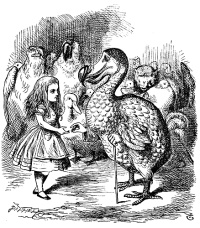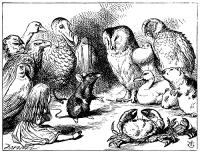A Caucus-Race and a Long Tale
Studies in Alice III, by Marc Edmund Jones
This lesson considers the third chapter of Alice in Wonderland and the third great principle of wisdom in the Philosophy of Concepts as revealed through the adventures of Alice is that the basis of all life is economic relations. Of all things of which the senses may have direct knowledge or contact, money is the most spiritual for the reason that currency is the outward manifestation of economic relations elevated into spiritual or idea realms. When men graduate from the barter stage into the use of coined or established money they are accepting the idea as the basis of value. The difference between man and animal is that man builds a life in which necessity is subordinated to idea, or that ideas become necessities to the extent that privation of lower necessities will cheerfully be accepted as the price for obtaining the higher, whereas animals unless brought into subjection to idea as in domestication have no conception of value but instead react to necessities of bare existence without idea and so without sensation as sensation is known to man. To the degree in evolution that necessities are embodied in idea, to that degree the social state is economic built on property rights and established laws of conduct wholly idea in both cases. The bounty of nature is subordinated to idea as property and the bounty of man is subordinated to idea no less when every detail of love and friendship is made subject to custom. In money alone in its fact, as in contrast with ideas of its use and exchange, is found a foundation for human relations. The community creates its legal value as in currency and the individual possessing it in any part creates for himself its power in administering his individual relations to the whole of the community and the race through its spending value. It is the idea of man at large that gives gold its function as the standard of currency and it is the idea of each person that creates earning and spending power. Civilization is built on idea and not on necessities of food and shelter, and spirituality or higher understanding is built on the idea of fundamental value founded in idea. Money most perfectly reveals pure social idea.
 If life fundamentally is based
on ideas at its human or
thinking stage, and these ideas
are social in their foundation,
it might properly be expected
to find the policies or ideas of
life decided and first laid
down in assemblies of the
thinkers and leaders of
humanity. History has shown
this to be true from the tribal
gatherings in the night of time
down through parliaments and
through schools of thought to
the conferences of business,
clubs and organizations of the
complicated life of the
modern world. Thus the
caucus that sometimes is secret in fact, but is always secret in consciousness to the extent that
idea is secret until it becomes fact, confirms that in evolution idea always precedes fact. The
symbolism of this third chapter in Alice is therefore most remarkable in showing, as the
inevitable result of falling into manifestation or into the pool of tears, a caucus of the elements of
consciousness. In the prior lesson the animals were seen to be the traits of man. To this it is
interesting to add here a note on the dominance of the mouse or rather the rodentia since the
all-important rabbit belongs to the same family. This group of mammals are the gnawers and by
far the most numerous group and symbolize aptly the fact that this trait represents the most
important in man. The biting into life is the first, last and only real basis of selfhood.
If life fundamentally is based
on ideas at its human or
thinking stage, and these ideas
are social in their foundation,
it might properly be expected
to find the policies or ideas of
life decided and first laid
down in assemblies of the
thinkers and leaders of
humanity. History has shown
this to be true from the tribal
gatherings in the night of time
down through parliaments and
through schools of thought to
the conferences of business,
clubs and organizations of the
complicated life of the
modern world. Thus the
caucus that sometimes is secret in fact, but is always secret in consciousness to the extent that
idea is secret until it becomes fact, confirms that in evolution idea always precedes fact. The
symbolism of this third chapter in Alice is therefore most remarkable in showing, as the
inevitable result of falling into manifestation or into the pool of tears, a caucus of the elements of
consciousness. In the prior lesson the animals were seen to be the traits of man. To this it is
interesting to add here a note on the dominance of the mouse or rather the rodentia since the
all-important rabbit belongs to the same family. This group of mammals are the gnawers and by
far the most numerous group and symbolize aptly the fact that this trait represents the most
important in man. The biting into life is the first, last and only real basis of selfhood.
The achievement of imagination in the chapter, or the third great scientific anticipation, is the revelation of the social and economic laws of nature especially as embodied in the great American experiment of mass production in industry based on the sharing of profits by labor. The principles here are so newly worked out as to raise a question in many minds as to their real establishment in fact. Nevertheless the demonstration is too widespread and successful to be longer ignored. To the business world the whole experiment is summed up in the meaningless term scientific management. The pioneer in the intelligent development and analysis of the principles is Frederick Winslow Taylor. There is no need to go further in the matter than to state the conclusion barely accepted as yet by management engineers that time and not gold is the real basis of value.
To the degree a man without loss of earning capacity keeps his wage or salary up proportionately with the rise in cost of living that must always mark prosperity, and even compress his efforts by means of machinery and efficiency into less and less time, to that degree has greater time for the production of idea. This in turn whether for leisure or pleasure, creates as fact the new necessities for which his extra time yields consumption efficiency while the automatic and nondisturbing rise in the cost of living takes care of his spending capacity. Thus the whole creates new industrial activities that absorb the added needs for employment that are always attendant on prosperity. In the present chapter of Alice this far from vicious cycle is brought out in the aptly named caucus race and in the prizes that amount to exactly one apiece. The fact that the circle need not be round symbolizes the power of self-adjustment in life, just as the fact that each player may leave off when he wishes, serves to illustrate the principle that real productive labor is based on idea or mental interest.
The law of applied psychology, or the third big idea for the solution of personal problems, is brought out in the technique of achieved rewards in that the value of possessions is placed in them by social rather than inherited factors. A thing is always more desirable when admired by another or when possession of it is challenged. Only what is given to man as an award or reward for effort socially expressed holds real value. Here is seen the basis of sentiment, and when the dodo gravely presents to Alice the thimble that she already possesses he is merely putting into it the value it should hold for her. That an extinct bird or trait out of the past should do this is an unwitting stroke of genius in symbolism. Man's accumulated experience alone makes possible his added participation in the social scheme of things, and as his social place in life increases so does the value of everything touched by him gain in value. Value therefore reverts to selfhood and the phenomenon of selfhood is seen in the symbol of Dinah. The cat is Leo in the zodiac or the sign of inner or real self. The traits or animals flee at the dwelling on the self. However, Dinah does not appear in person on the scene. Creation is an outbreathing of self that adds to the traits and increases the value, and dissolution is the inbreathing into self that destroys outer life and values. The student must learn to SPEND WHAT HE HAS or to use it. Alice had the means to pay in her pocket for exactly the one confection apiece, and every man has within himself the ideas that added to proper expenditure of time will supply all his desires. The use of resources creates the values that are fundamentally the tangible and physical rewards of life and effort.

Sabian.org





